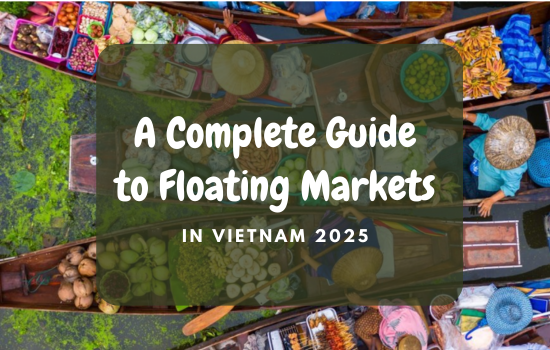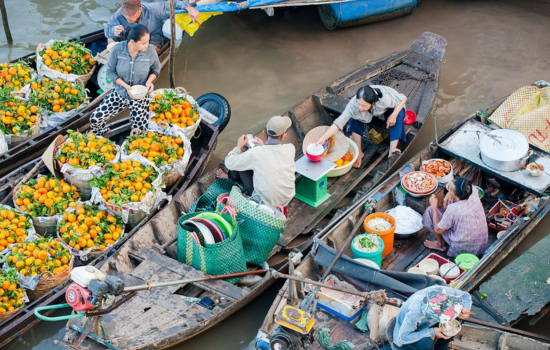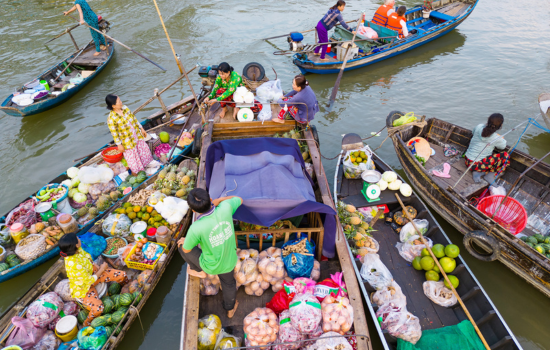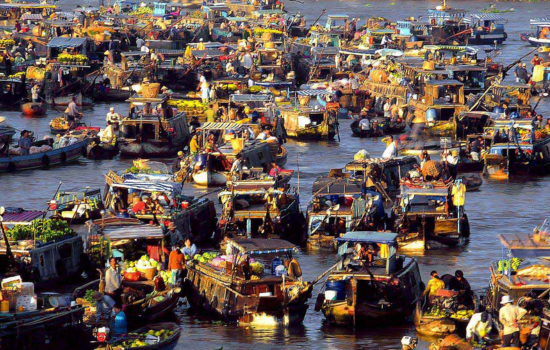


The Mekong Delta, often referred to as the "Rice Bowl of Vietnam" is an attractive region where rivers, culture, and commerce connect. One of the most captivating experiences in this area is visiting the floating markets—hubs of trade conducted entirely on waterways. For foreigners residing in Vietnam, especially educators looking to immerse themselves in local traditions, exploring these markets offers a unique glimpse into the daily lives of the Mekong's inhabitants.
Floating markets are traditional marketplaces where vendors sell goods directly from their boats. These markets have been central to the Mekong Delta's commerce for centuries, facilitating the exchange of fruits, vegetables, and other local products. The waterways serve as the primary means of transportation and trade, making these markets integral to the region's economy and culture.
Located near Can Tho, Cai Rang is the Mekong Delta's largest and most renowned floating market. The market starts as early as 4:00 AM and continues until around 10:00 AM. Vendors hang samples of their goods on poles, making it easy for buyers to identify products from a distance. A visit here offers insights into the wholesale trading of fruits and vegetables that the region is famous for.

For a more intimate experience, Phong Dien offers a quieter alternative to Cai Rang. This market is less crowded and provides a closer look at local life, with vendors often engaging in both selling and bartering. It's an excellent spot for those looking to avoid the tourist rush and see a traditional market in action.

Situated in Tien Giang Province, Cai Be is known for its picturesque setting and diverse range of goods. While it's smaller than Cai Rang, it offers a charming experience with vendors selling everything from fresh produce to handicrafts. The market is most active from 5:00 AM to 8:00 AM.

The optimal time to visit these markets is during the dry season, which spans from December to April. Early mornings are ideal, as the markets are most active during these hours, and you'll also avoid the midday heat.
Several local operators offer guided boat tours of the floating markets. These tours often include hotel pickup, a boat ride through the markets, and sometimes visits to local workshops or fruit orchards. Prices vary, so it's advisable to research and book in advance.
Visiting the floating markets isn't just a shopping trip; it's an opportunity to explore the Mekong Delta's rich cultural treasure. The markets exemplify the resourcefulness and adaptability of the local communities, showcasing a way of life that has persisted despite modern changes.
For foreign teachers, incorporating experiences from these visits into your curriculum can provide students with tangible examples of Vietnamese culture and commerce. It also offers a personal connection to the material, enriching the educational experience for both teachers and students.
Exploring the floating markets of the Mekong Delta is a journey into the heart of Vietnam's cultural and economic lifeblood. For expatriates and educators, it's an invaluable experience that offers both personal enrichment and professional inspiration. By planning thoughtfully and engaging respectfully, you can ensure a visit that is both enjoyable and enlightening.
Embark on this adventure to witness firsthand the attractive life of the Mekong Delta's floating markets—a testament to Vietnam's enduring traditions and dynamic spirit.
Copyright © 2024.Company name All rights reserved.